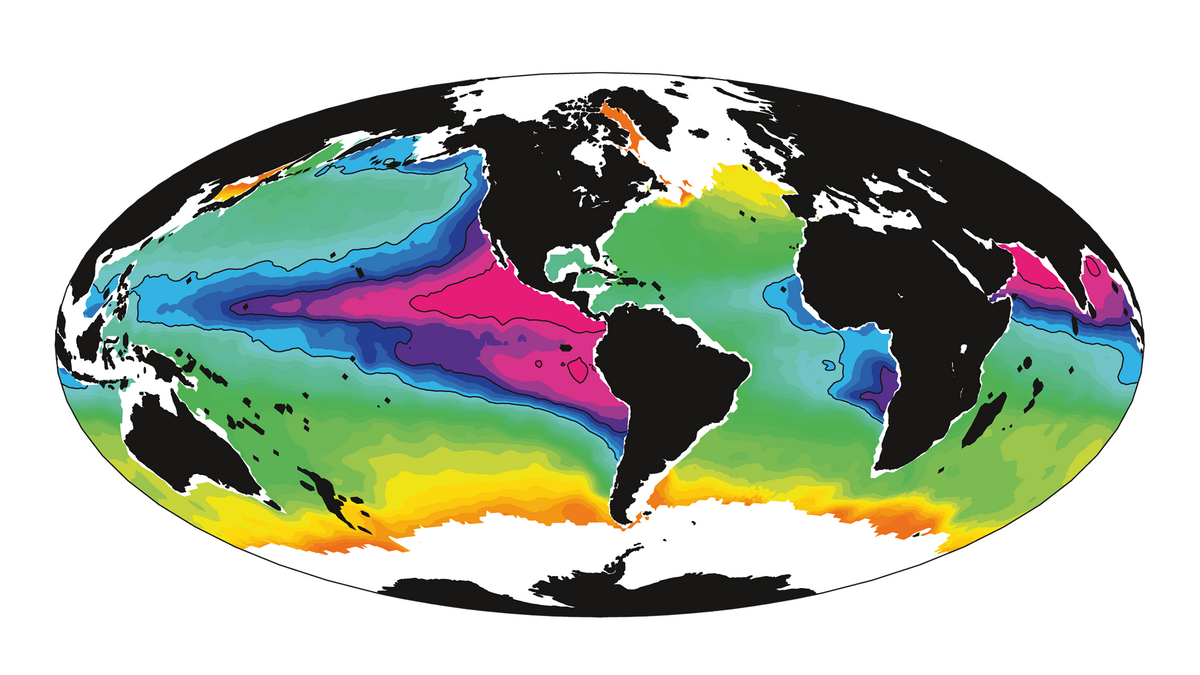The animation illustrates the formation of an oxygen minimum zone at the eastern continental margins in the tropics. Lack of oxygen occurs in the upwelling regions of the oceans. Here, nutrient-rich deep water reaches the surface. The abundance of nutrients and plankton at the surface leads to high oxygen consumption in deeper zones. There, only weak currents occur that transport relatively oxygen-poor water. Animation: Rita Erven/GEOMAR
Ocean Oxygen: The Ocean is Running Out Of Air
In some ocean regions, oxygen is naturally present in very low concentrations - with significant impacts on their living conditions. These are not small, hidden corners, but considerable areas of the world ocean: the so-called oxygen minimum zones (OMZ) extend over large parts of the tropical seas.
At GEOMAR, the complex biogeochemical interactions in the ocean have been studied for many years, among others in the Collaborative Research Centre 754 Climate Biogeochemical Interactions in the Tropical Ocean (SFB 754) funded by the German Research Foundation (DFG).
The focus was on changes in the oceanic oxygen content, their possible impact on the oxygen minimum zones and the consequences for the global interplay of climate and biogeochemistry of the tropical ocean, in order to allow a more accurate prediction of future biogeochemical changes in the ocean and the associated climatic consequences.
The Global Oxygen Decade GOOD
As a contribution the the United Nations Decade of Ocean Science for Sustainable Development, GEOMAR coordinates the Global Ocean Oxygen Decade (GOOD) programme on behalf of the Global Ocean Oxygen Network (GO2NE). GOOD will raise global awareness about ocean deoxygenation, provide knowledge for action and develop mitigation and adaptation strategies and solutions to ensure continued provision of ecosystem services, and minimize impacts on the ocean economy.
”The ocean is losing oxygen at an alarming rate, threatening marine ecosystems and ocean services to society. With the GOOD programme we will bring together science and society to better understand and monitor oxygen changes, as well as to develop solutions for mitigation and adaptation”, says Prof. Dr. Andreas Oschlies, coodinator of GOOD at GEOMAR.
How ocean deoxygenation entered the global agenda
The results of more than ten years of research are disturbing: the amount of water in the ocean that lacks any oxygen has quadrupled in the past 50 years. Globally, the ocean has lost two percent oxygen. In the long term, these changes can have far-reaching consequences for marine ecosystems and the climate. The main reasons are considered to be increasing warming and the over-fertilisation of the ocean. A comparison of measured data and the results of complex model simulations shows that even the best computer models significantly underestimate the changes observed so far.
At the final conference of the SFB 754 in 2019, the scientists therefore published an urgent appeal, the "Kiel Declaration", in which they call for more marine and climate protection.
In this video, SFB 754 draws a conclusion and at the same time points out the new research tasks that have resulted from its work. These include better ocean observation and the question of how further oxygen loss can be avoided.



